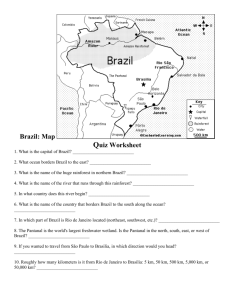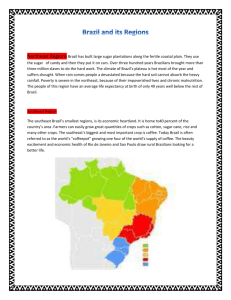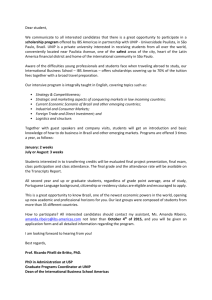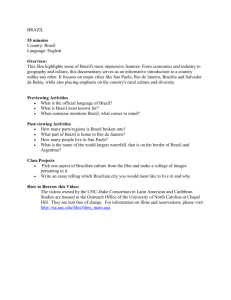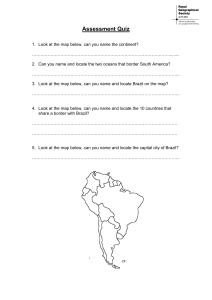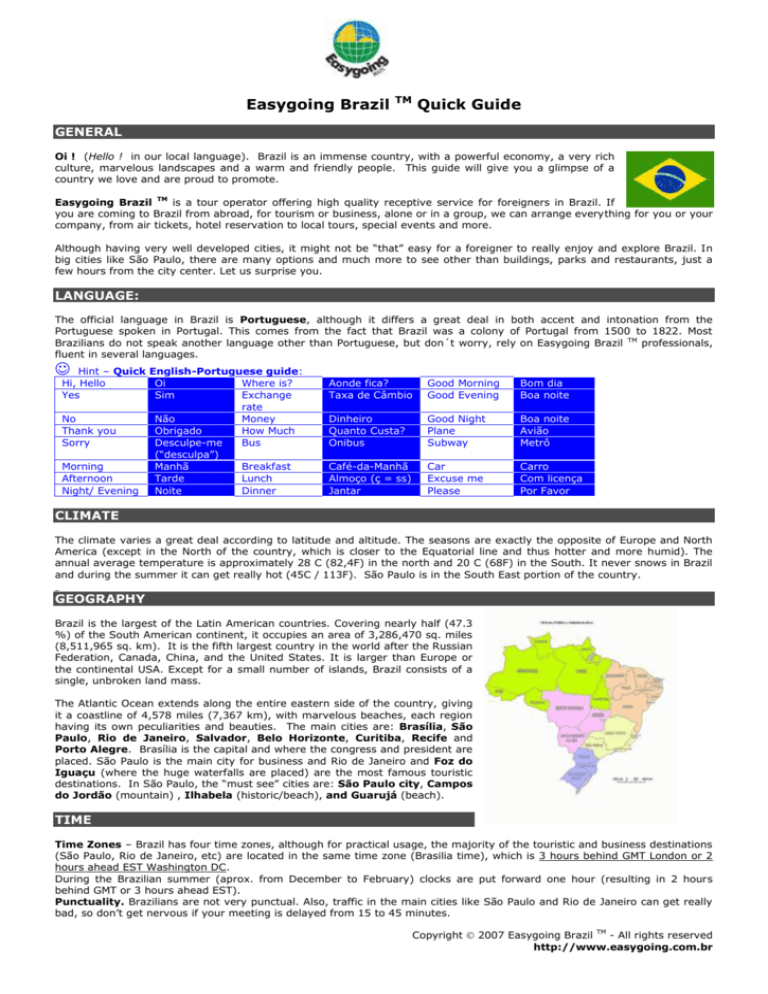
Easygoing Brazil
TM
Quick Guide
GENERAL
Oi ! (Hello ! in our local language). Brazil is an immense country, with a powerful economy, a very rich
culture, marvelous landscapes and a warm and friendly people. This guide will give you a glimpse of a
country we love and are proud to promote.
Easygoing Brazil TM is a tour operator offering high quality receptive service for foreigners in Brazil. If
you are coming to Brazil from abroad, for tourism or business, alone or in a group, we can arrange everything for you or your
company, from air tickets, hotel reservation to local tours, special events and more.
Although having very well developed cities, it might not be “that” easy for a foreigner to really enjoy and explore Brazil. In
big cities like São Paulo, there are many options and much more to see other than buildings, parks and restaurants, just a
few hours from the city center. Let us surprise you.
LANGUAGE:
The official language in Brazil is Portuguese, although it differs a great deal in both accent and intonation from the
Portuguese spoken in Portugal. This comes from the fact that Brazil was a colony of Portugal from 1500 to 1822. Most
Brazilians do not speak another language other than Portuguese, but don´t worry, rely on Easygoing Brazil TM professionals,
fluent in several languages.
Hint – Quick English-Portuguese guide:
Hi, Hello
Oi
Where is?
Yes
Sim
Exchange
rate
No
Não
Money
Thank you
Obrigado
How Much
Sorry
Desculpe-me
Bus
(“desculpa”)
Morning
Manhã
Breakfast
Afternoon
Tarde
Lunch
Night/ Evening
Noite
Dinner
Aonde fica?
Taxa de Câmbio
Good Morning
Good Evening
Bom dia
Boa noite
Dinheiro
Quanto Custa?
Onibus
Good Night
Plane
Subway
Boa noite
Avião
Metrô
Café-da-Manhã
Almoço (ç = ss)
Jantar
Car
Excuse me
Please
Carro
Com licença
Por Favor
CLIMATE
The climate varies a great deal according to latitude and altitude. The seasons are exactly the opposite of Europe and North
America (except in the North of the country, which is closer to the Equatorial line and thus hotter and more humid). The
annual average temperature is approximately 28 C (82,4F) in the north and 20 C (68F) in the South. It never snows in Brazil
and during the summer it can get really hot (45C / 113F). São Paulo is in the South East portion of the country.
GEOGRAPHY
Brazil is the largest of the Latin American countries. Covering nearly half (47.3
%) of the South American continent, it occupies an area of 3,286,470 sq. miles
(8,511,965 sq. km). It is the fifth largest country in the world after the Russian
Federation, Canada, China, and the United States. It is larger than Europe or
the continental USA. Except for a small number of islands, Brazil consists of a
single, unbroken land mass.
The Atlantic Ocean extends along the entire eastern side of the country, giving
it a coastline of 4,578 miles (7,367 km), with marvelous beaches, each region
having its own peculiarities and beauties. The main cities are: Brasília, São
Paulo, Rio de Janeiro, Salvador, Belo Horizonte, Curitiba, Recife and
Porto Alegre. Brasília is the capital and where the congress and president are
placed. São Paulo is the main city for business and Rio de Janeiro and Foz do
Iguaçu (where the huge waterfalls are placed) are the most famous touristic
destinations. In São Paulo, the “must see” cities are: São Paulo city, Campos
do Jordão (mountain) , Ilhabela (historic/beach), and Guarujá (beach).
TIME
Time Zones – Brazil has four time zones, although for practical usage, the majority of the touristic and business destinations
(São Paulo, Rio de Janeiro, etc) are located in the same time zone (Brasilia time), which is 3 hours behind GMT London or 2
hours ahead EST Washington DC.
During the Brazilian summer (aprox. from December to February) clocks are put forward one hour (resulting in 2 hours
behind GMT or 3 hours ahead EST).
Punctuality. Brazilians are not very punctual. Also, traffic in the main cities like São Paulo and Rio de Janeiro can get really
bad, so don’t get nervous if your meeting is delayed from 15 to 45 minutes.
Copyright 2007 Easygoing Brazil TM - All rights reserved
http://www.easygoing.com.br
CURRENCY
The Brazilian currency is called the “REAL” (“REAIS” for plural), and its symbol is R$.
American Dollars and Euros can be changed to Reais at hotels, “exchange desks” and at some travel
agencies.
The Exchange Rate can vary significantly. The current level (March 2008), except for peaks and valleys, has
been around 1: 1.60 (1 american dollar equals 1.60 reais). Check the daily exchange rate at
http://www.bacen.gov.br (english > foreign capitals and exchange rates).
A great portion of the hotels, restaurants, bars, nightclubs and travel agencies accept payments using Credit Cards.
Hint: Cash. Make sure you bring some cash and change it to the Brazilian currency (REAIS R$) right after arrival if
possible, as Taxi cabs and some small stores do not accept traveler checks or credit cards.
Hint: you can withdraw money in Brazil using your bank debit card if it is associated to PLUS or CIRRUS (which work with
Visa & Mastercard).
WEIGHTS, TEMPERATURES AND MEASUREMENTS
Temperature. In Brazil it is used the Celsius scale and the metric system:
Hint:nge Fahrenheit to Celsius:
Fahrenheit
subtract 32,Celsius
multiply by 5/9 (0,56)
23
-5
To change
Celsius to
32
0 Fahrenheit:
Ice
multiply by 9/5
59
15(1,8), add 32
77
25
98,1
36,7
Normal Body Temperature
104
40
High Fever
212
100
Boiling point for water at
level
250
120
Low (oven)
350
180
Moderate (oven)
450
230
Hot (oven)
Imperial Metric
Metric
1 inch
2,54 centimeters
1 centimeter
1 foot
30 centimeters
1 meter
1 mile
1,6 Kilometers
1 kilometer
sea
Imperial
Aprox. 0,4 inch
3 feet and 3 inches
0,6 mile
1 gallon
3,8 liters
1 liter
Aprox. ¼ gallon
1 ounce
1 pound
28 grams
454 grams
1 gram
1 kilo
0,04 ounce
2,2 pounds
SECURITY:
As many other big countries around the world, Brazil can be an unsafe place, specially if you have never been here before.
Our people is mild and friendly, but unfortunately, due to several social and economic issues, there is some incidence of
crime, specially in the main cities. One of Easygoing Brazil TM primary goals is to provide a safe trip to our customers.
Let´s us worry while you have lots of fun.
-
-
Hint: please find below some recommendations to avoid problems while in Brazil:
Try not to look like a tourist. Cameras hanging on your neck, Hawaiian shirts and Australian Hats will not make things
easier for you here. Try to be discrete in outdoor situations;
Don’t carry all your stuff with you. Carry only a copy of your passport, not the original. We recommend putting your
personal belongings in the hotel’s safe, if available;
Take care with Taxis. Although very common and numerous in the country, a few taxi drivers are not reliable. By the
statistics and being a foreigner, you have a chance either to be robbed or to pay more than you deserved for a ride.
Make sure you know how much it approximately costs for the ride you are taking, and that the taxi cab look like a cab (a
car with TAXI sign on top - the color will vary depending on the city where you are).
Relax !!! Millions of tourists come to Brazil every year without any incident. It is not that bad and we will take care of
you !!!
Copyright 2007 Easygoing Brazil TM - All rights reserved
http://www.easygoing.com.br
TELEPHONY & COMMUNICATION
Hint: how to make phone calls while in Brazil:
Call Type
Instructions
From a fixed line (fixed phone)
Local Calls
Simply dial the destination
number that will have 7 or 8
digits
Long
Dial “0”, the operator’s 2
Distance
digit code “XX”, the area
Calls
code
“AA”
plus
the
destination number
Dialing Format
Operators
Main City Area
Codes (“AA”)
abcd-efgh or
abc-defg
0 XX AA abcd-efgh
International
Calls
Dial “00” plus the operator 00
XX
YY
code “XX”, the destination destination number
country code “YY” plus the
destination number (which
will also contain the foreign
area code)
From a local cellular phone (mobile phone), same rules apply
While in São Paulo,
XX may be:
- “21” (Embratel)
- “15” (Telefónica)
- “23” (Intelig)
While in Rio de
Janeiro, XX may
be:
- “15” (Telefónica)
- “21” (Embratel)
- “23” (Intelig)
- “31” (Telemar)
International Long
Distance Operators
code
(XX)
are
Embratel
“21”,
Intelig “23” and
Telefónica “15”
São Paulo
Rio
de
Janeiro
Belo
Horizonte
Curitiba
Porto
Alegre
Brasília
Salvador
Recife
11
21
31
41
51
61
71
81
Examples of calls from fixed line phones:
-
To dial from São Paulo to Rio de Janeiro:
0 21 21 abcd-efgh (using Embratel) or 0 15 21 abcd-efgh (using Telefonica)
To dial from Rio de Janeiro to Salvador:
0 21 71 abcd-efgh (using Embratel) or 0 31 71 abcd-efgh (using Telemar)
To dial from São Paulo to Miami (USA country code is +1, Miami city code 305):
00 21 1 305 abcd-efgh (via Embratel) or 00 23 1 305 abcd-efgh (via Intelig)
Useful telephone numbers: Some consulates in São Paulo (If outside Brazil, dial +55 11 before):
Argentina 3284-1355
Australia 3078-6281
Austria 3082-6223
Canada 5509-4321
Chile 3284-2044
Denmark 3061-3625
Finland 3167-3685
France 287-9522
Germany 3814-6644
Great-Britain 3816-2303
Holand 3813-0522
Israel 3815-7788
Italy 3826-9022
Mexico 3081-4144
New Zeland 288-0307
Norway / Sweden 3061-1700
Portugal 3154-1800
Spain 3059-1800
Switzerland 3253-4951
USA 3081-6511
Other numbers
Easygoing Brazil
Guarulhos Intl. Airport (SP)
Congonhas Local Airport (SP)
+5511 3801-9540
non-business
hours:
+55 11 9131-9516
+55 11 6445-2945
+55 11 5090-9000
Internet Access Office Space: it can be tricky to get good Internet access if you are only traveling in Brazil (and not living
here). Cybercafes are the best option for checking emails. For office space, we recommend you to contact a real state agent
with service in foreign languages and discuss the possibility of a short term rent, if you´re staying for a couple of months or
more. For shorter periods, we recommend you to discuss it with your hotel as the companies specialized in providing
temporary office space are extremely expensive and not very flexible for renting periods shorter than a month.
TRANSPORTATION
Car Rental – Rental car companies offer their services at the main airports of all large cities. All Easygoing tours include
door to door transportation.
Hint: Drivers License. Make sure you bring your driver’s license. Brazil accepts any valid driver license from your origin
country, printed in the Roman alphabet and with a valid date.
Hint: Driving in Brazil. If you intend to drive in Brazil, we recommend you to buy a good local street guide, which is
sold at any newsstand or at airports bookstores.
Hint: Traffic. Car traffic in Brazil, specially in the big cities, is hectic. Try to avoid peak hours (07:00 to 10:00, 17:00 to
20:00). For appointments, leave early and try to book them with a great time gap between them.
Copyright 2007 Easygoing Brazil TM - All rights reserved
http://www.easygoing.com.br
Taxis – There are a large number of taxis in all major towns and cities. Common taxis can be hailed in the street or radio
taxis can be ordered by phone.
Hint: Taxi drivers. A great majority of the taxi drives do not speak any language other than Portuguese. Make sure you
have a written copy of the destination address with you.
Subway – Different from what you’re probably imagining, our subway is clean, safe and modern. The only downside of it is
that there are not many lines available and only a few cities have it. São Paulo has the most extensive subway coverage of
the country.
Buses – “Long Distance” Buses are one of the most popular form of transportation for traveling big distances inside Brazil
(from state to state, for instance). It is usualy organized and safe to travel on these buses. Local Buses are also widely used
by the urban population as a mean of transportation in all major cities. We do not recommend tourists to use the local buses
in the big cities to commute from one location to another, as they are often crowded, with complex routes;
Planes - Brazil has a network of well structured and highly efficient airports (67 commercial airports total). Most international
flights from Europe and the US land at the international airports of São Paulo, Rio de Janeiro, Recife or Salvador, where there
are connecting flights to most other major Brazilian cities. Rio de janeiro and São Paulo both have major international
airports, as well as airports closer to the city center which are used for the 55 minute air-shuttle between the two cities and a
number of other short regional services. Rio’s airports are Antônio Carlos Jobim (GIG) for international and Santos Dumont
(SDU) for the shuttle, while São Paulo’s are Guarulhos (GRU) for international and Congonhas (CGH) for the air shuttle.
Hint: Airpass. Visitors who are intending to travel from their point of entry to explore the rest of Brazil should consider
investing in a Brazilian Airpass before arriving in the country. The Airpass can only be sold outside of Brazil and to nonresidents with a return air ticket. It can be purchased for the flights of Varig or TAM, each pass only being valid for the
flights of the issuing carrier. The price of the Airpass varies, but considering the size of Brazil and the cost of internal
Brazilian air travel it offers excellent value for money. Upon the purchase of an air pass, the holder can fly up to five
internal flights. The pass is valid for 21 days from the first internal flight. There is also a South American Airpass which
allows the holder to travel economically throughout Brazil, Argentina, Chile, Uruguay and Paraguay. The cost of the
South American Airpass is based on the number of miles flown.
Trains: trains are barely used for citizen transportation in Brazil. They’re mostly used to transport goods, although most of
the freights in Brazil are performed via roads or by air.
PEOPLE & CULTURE
Population: Brazil currently has a population of approximately 170 million, making it the world’s fifth most populous nation.
There are 11 cities in Brazil with a population of over one million, of which São Paulo is the largest with 10.4 million residents
and Rio de Janeiro second with 5.8 million.
The Brazilian population is originally a result of the mixture of our native people (Indians), the Portuguese people, Africans
brought as slaves in the past and hundreds of thousands of immigrants provenient from several countries, such as Italy,
Japan, Germany and Siria, to name some. The Brazilian people is friendly and famous by its joy. Our culture is very rich and
very linked to music. Make sure you check our handicraft and music while in Brazil.
Racism. There is no “official” racism in Brazil, such as Appartheid or other form of “structured” discrimination. No one can
be discriminated or prevented to do anything due to its color, gender or religion. In the last decade, homosexuals started to
demand their space in society and the group, today, plays a relatively significant role in the Brazilian society.
Religion: Catholicism is the predominant religion, followed by the Evangelics, which have been growing in volume
significantly. The Muslim and Jewish religions are the choice of a minority in Brazil.
Hint: Gestures. Brazilians (like Italians and other peoples of the world) use gestures all the time while speaking. This
is one of the mostly used symbols and it means “OK”, “All Right”, but can also mean “Thank you”.
SPORTS
Soccer represents by far the most important sport in the country. There are dozens of teams and championships, and
millions of fanatic rooters. Brazil is the soccer world leader, winning 5 times the Soccer World Cup, which occurs every 4
years. In the international ranking, it is followed by Argentina and Germany (3 times world champions). Brazil is the only
country that participated in all Soccer World Cups.
Other sports like Swimming, Surf, Volleyball, Basketball, Tennis, Judo and Formula-1 are also very popular. Sports such as
Hockey, Baseball or American Football, widely played in other countries, are not popular at all in Brazil.
HOTEL ACCOMODATION
Brazil has a vast network of hotels, from International chains to guest houses and cottages, which guarantee the comfort and
safety of the guest if properly chosen and booked. Easygoing Brazil can do hotel reservations for you at great rates.
Copyright 2007 Easygoing Brazil TM - All rights reserved
http://www.easygoing.com.br
LEISURE & FOOD
Restaurants and Bars. Brazil is a melting pot. For centuries it received immigrants from everywhere in the world and it is
reflected in its cousine. Brazil has a vast and rich culinaire and thousands of restaurants. Nightlife is also exuberant as
Brazilians love to go out and party. While in Brazil, make sure you go to a typical “Churrascaria”, a restaurant where all
kinds of meet is served “non-stop”.
In terms of drinks, the legal age to purchase alcoholic beverages in Brazil is 18. Brazil produces or imports most of the major
international brands. Brazilian beer is a very good lager which is served in draught form (chopp) or bottled. The national drink
is Cachaça, made from crushed sugar cane, which is the basis of the popular drink called caipirinha (Cachaça, Suggar and
Smashed Lemon). Cachaça is also the basis for “batidas”, a mix of cachaça and fresh fruit juices. Soft drinks are no less
spectacular and the most popular is Guaraná, made out of the fruit called Guaraná which originaly comes from the Amazon
forest. Brazil is also the world’s largest coffee producer. Brazilians like strong coffee and it is appreciated in small quantities,
with suggar.
Hint: Tipping. In most
restaurants the tip is already
included in the bill (10%
service charge). Taxi drivers
do not expect to be tipped.
Hotel and airport porters
should receive the equivalent
of US$0.75 per bag.
Hint: Churrascaria. When in
a Churrascaria, the following
“diagram” will help you know
what you’re eating.
VOLTAGE
In most Brazilian cities the voltage is either 110 or 220 volts, 60 cycles, with the exception of Salvador and Manaus, where it
is 127 volts. Most hotels have sockets of both 110 and 220 volts and/or supply voltage transformers.
Hint: Electric Connectors. Make sure you bring an AC adaptor from 3 to 2 pins. Some inlets (sockets) in Brazil do not
have a hole for the 3rd pin (ground pin), only accepting 2-pin plugs.
POSTAL SERVICE
The postal service in Brazil is very efficient but at least a week should be allowed for postcards and letters mailed in each
direction. We also have all major courier companies stablished in the country such as FEDEX and UPS. The express door-todoor mail service in Brazil is known as SEDEX and operates from most of the main post offices. There is also an Express Mail
Service (EMS) for international mail and this is often as fast as a courier service and a lot cheaper.
Hint: Addresses in Brazil are written as follows:
Street name, Number
City / Town
District / County / Province
ZIP Code (format xxxxx - xxx)
Country
In the street name, the following abreviations are used:
R. (Rua)
Street
Al. (Alameda) Street with lined up trees
Av. (Avenida)
Avenue
Pr. (Praça)
Square
BUSINESS HOURS
The majority of shops are open from 09:00 to 18:00 Hs on weekdays and from 09:00 to 13:00 on Saturdays, and are
closed on Sundays. However, many Shoppping Centers stay open until 22:00 Hs from Monday to Saturday, and have stores
open on Sundays as well. Banking hours are from 10:00 to 16:00 Hs, although all the large banks offer 24 hour ATM’s.
Copyright 2007 Easygoing Brazil TM - All rights reserved
http://www.easygoing.com.br
POLITICS & DEMOCRACY
Brazil adopts Presidencialism as its governing system is based on a 4 year mandate for the elected president. Voting is
mandatory for all citizens. Democracy is a reality, although drastic social differences and corruption bring an additional
challenge to the establishment of a real democracy.
Men and women have equal rights and duties and no one shall be obliged to do or refrain from doing something except by
virtue of law. Freedom of conscience and of belief is inviolable, the free exercise of religious cults being ensured and, under
the terms of the law, the protection of places of worship and their rites is also guaranteed. The expression of intellectual,
artistic, scientific, and communications activities is free, independently of censorship or license. The Brazilian press enjoys
freedom of speech and access to information is ensured to everyone, the confidentiality of the source being safeguarded,
whenever necessary to the professional activity. The right of reply is ensured, in proportion to the offence, as well as
compensation for property or moral damages or for damages to the image. The practice of any work, trade or profession is
free, observing the professional qualifications that are established by legislation. Freedom of association for lawful purposes is
fully guaranteed. The democratic regime is now fully consolidated and has become part of the core of the Brazilian legal
system.
WHEN TO GO & MAIN EVENTS
Brazil has a privileged location and it can be visited throughout the whole year.
Carnival. It takes place all over Brazil and it is a huge and moveable feast that is tied to the religious Calendar. Carnival
activities in Brazil usually take place from the Friday prior to Ash Wednesday and continue up to and including Ash
Wednesday itself. In some cities the celebrations will spill over through the entire week and include the following weekend.
Most Brazilian offices and business will close for the week of Carnival.
Brazilians enjoy Carnival in different ways. For some, it is only a large holiday and they travel to quiet places or enjoy the
cities that become very empty as most of the population travel to the cities located at the coast. In some places there are
outdoor parades. In others, people go to clubs that offer indoor parties with Samba music and people wearing costumes.
One of the traditional highlights of carnival is the parade of the top samba schools in Rio de Janeiro, which takes place on the
Sunday and Monday nights of carnival along the purpose built Passarela do Samba (“Sambódromo”), located on Avenida
Marques de Sapucaí, close to downtown. It is a fierce competition and these schools prepare for it during the whole year.
The winners’ parade, featuring the top samba schools from all the divisions, will take place on the following Saturday (March
28th in 2009).
Tickets for the parades can normally be reserved through most good tour operators. The dates for the Sunday and Monday
night 2009 parades in Rio will be Feb 22nd and 23rd, respectively. In São Paulo it will occur Friday 20th and Sat 21st.
REQUIREMENTS FOR VISITING BRAZIL
Visa. A visa is not required for holders of passports from Europe or South America. As a matter of reciprocity, visas are
required for those from North America.
Passports must be valid for at least six months and a return ticket and proof of sufficient funds may be requested on arrival.
Tourists will be admitted for a stay of up to 90 days which is extendable, at the discretion of the Federal Police, for a further
90 days. Passports must be valid for at least six months after the planned date of arrival in Brazil. Tourists are not permitted
to work. For more visa information, please contact the Brazilian Consulate of your city / state and / or your travel agent.
Vaccination. If you’re going to the most famous touristic destinations in Brazil such as Rio de Janeiro, São Paulo, the south
region (Foz do Iguaçu) or North East (Fortaleza, Salvador, Recife, Natal, etc), don’t worry about vaccination. Only be aware
that an international certificate of vaccination against polio is compulsory for children aged between three months and six
years.
An international certificate of vaccination against yellow fever is compulsory for travellers who, within the three months prior
to their arrival in Brazil, have visited or been in transit through any of the following countries: Angola, Benin, Bolivia, Burkina
Faso, Cameroon, Colombia, the Democratic Republic of Congo, Ecuador, French Guyana, Gabon, Gambia, Ghana, Guinea
Bissau, Liberia, Nigeria, Peru, Sierra Leone, Sudan, Venezuela and Zaire.
Additionally, vaccination against yellow fever is recommended for all travellers when visiting the following states of Brazil:
Acre, Amazonas, Amapá, Distrito Federal, Goiás, Maranhão, Mato Grosso do Sul, Pará, Rondônia, Roraima and Tocantins.
Please note that yellow fever vaccinations take approximately 10 days to become effective.
If there is any doubt about the need for vaccinations, please contact the Brazilian Consulate General.
Copyright 2007 Easygoing Brazil TM - All rights reserved
http://www.easygoing.com.br

